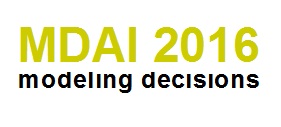INVITED TALKS
Plenary talks will be given by Profs. Tomoharu Nakashima, Montserrat Guillén, Juan Antonio Rodríguez-Aguilar, and Jordi Herrera-Joancomartí.
ABSTRACTS
Prof. Tomoharu NAKASHIMA
Osaka Prefecture University (Japan)
Machine learning and soft computing methods and their application to robocup soccer simulation
Abstract:
To be determined.
Prof. Montserrat Guillén
Dept. Econometrics, Universitat de Barcelona
Fundamentals of risk measurement and aggregation for insurance applications.
Abstract:
The fundamentals of insurance are introduced and alternatives to risk measurement are
presented, showing how to quantify the size and likelihood of future losses. Real data
indicate that insurance companies observe a lot of small losses and only a few large
claims or extremes, which occur very rarely. This is known as the skewness of the profit
and loss variable, which is specially troublesome for risk quantification, but is
successfully addressed with generalizations of kernel estimation. In connection with
this approach, distorsion risk measures study the expected losses of a transformation of
the original data. GlueVaR risk measures are presented. The notion of sub-additivity and
tail-subadditivity is discussed and an overview of risk aggregation is given with some
additional applications to insurance.
Prof. Juan Antonio Rodríguez-Aguilar
Artificial Intelligence Research Institute (IIIA-CSIC)
Aggregation operators to support collective reasoning
Abstract:
Moderation poses one of the main Internet challenges. Currently, many Internet platforms
and virtual communities deal with it by intensive human labour, some big companies –such
as YouTube or Facebook– hire people to do it, others – such as 4chan or fanscup – just
ask volunteer users to get in charge of it. But in most cases the policies that they use
to decide if some contents should be removed or if a user should be banned are not clear
enough to users. And, in any case, typically users are not involved in their definition.
Nobel laureate Elinor Ostrom concluded that societies –such as institutions that had to
share scarce resources– that involve individuals in the definition of their rules
performed better –resources lasted more or did not deplete– than those organisations
whose norms where imposed externally. Democracy also relies on this same idea of
considering peoples’ opinions.
In this vein, we argue that participants in a virtual community will be more prone to
behave correctly --and thus the community itself will be "healthier"—if they take part in
the decisions about the norms of coexistence that rule the community. With this aim, we
investigate a collective decision framework that: (1) structures (relate) arguments
issued by different participants; (2) allows agents to express their opinions about
arguments; and (3) aggregates opinions to synthesise a collective decision. More
precisely, we investigate two aggregation operators that merge discrete and continuous
opinions. Finally, we analyse the social choice properties that our discrete aggregator
operator satisfies.
Prof. Jordi Herrera-Joancomartí
Dept. of Information and Communications Engineering, Autònoma de Barcelona
Privacy in Bitcoin Transactions: New Challenges From Blockchain Scalability Solutions
Abstract:
Bitcoin has emerged as the most successful cryptocurrency since its appearance back in
2009. However, its main drawback to become a truly global payment system is its low
capacity in transaction throughput. At present time, some ideas have been proposed to
increase the transaction throughput with different impact on the scalability of the
system. Some of these ideas propose to decouple standard transactions from the blockchain
core, and to manage them through a parallel payment network, relegating the bitcoin
blockchain only for transactions which consolidate multiple of those off-chain
transactions. Such mechanisms generate new actors in the bitcoin payment scenario, the
Payment Service Providers, and new privacy issues arise regarding bitcoin users. In this
paper, we provide a comprehensive description on the most relevant scalability solutions
proposed for the bitcoin network, we analyse its impact on user's privacy and we outline
some research challenges on that topic.
